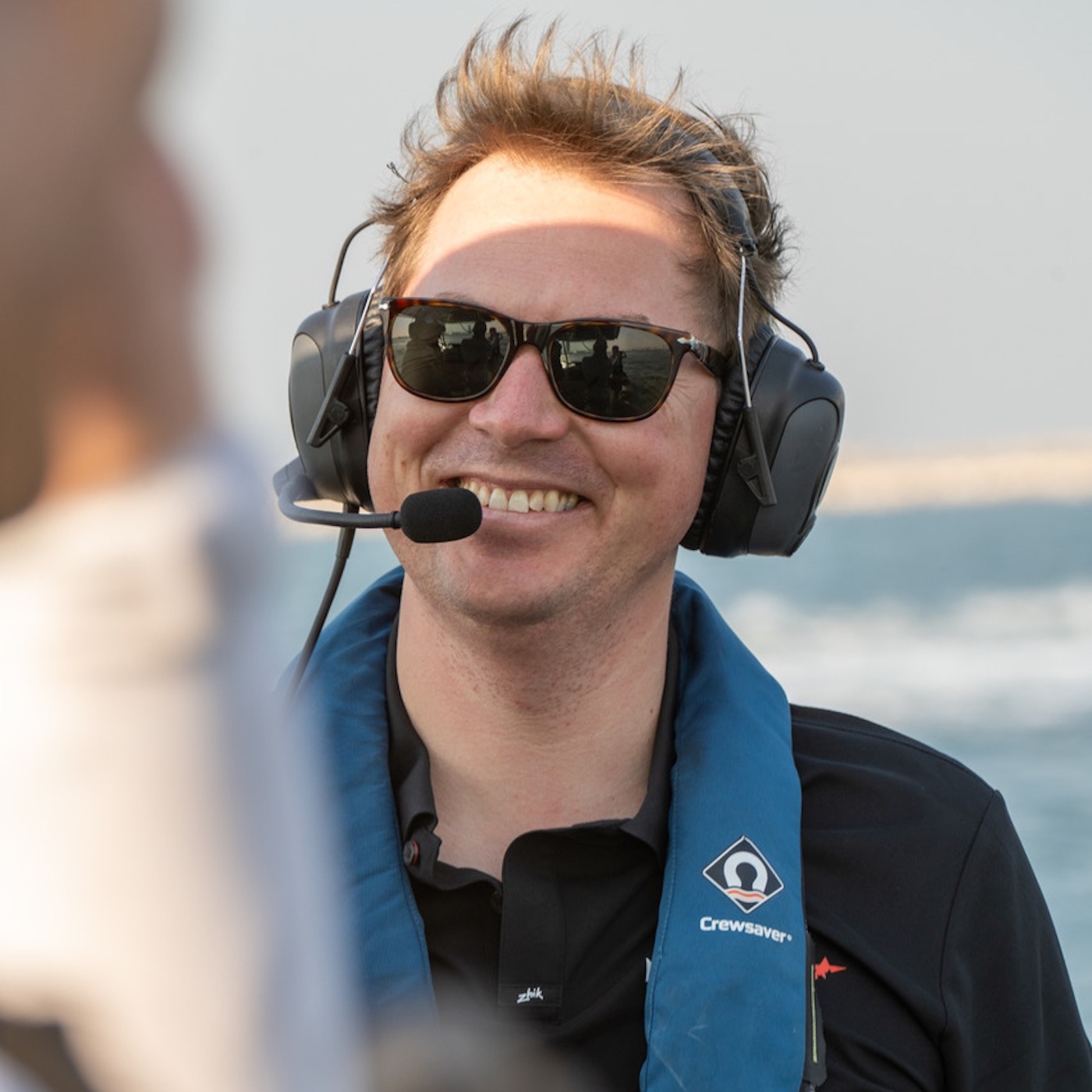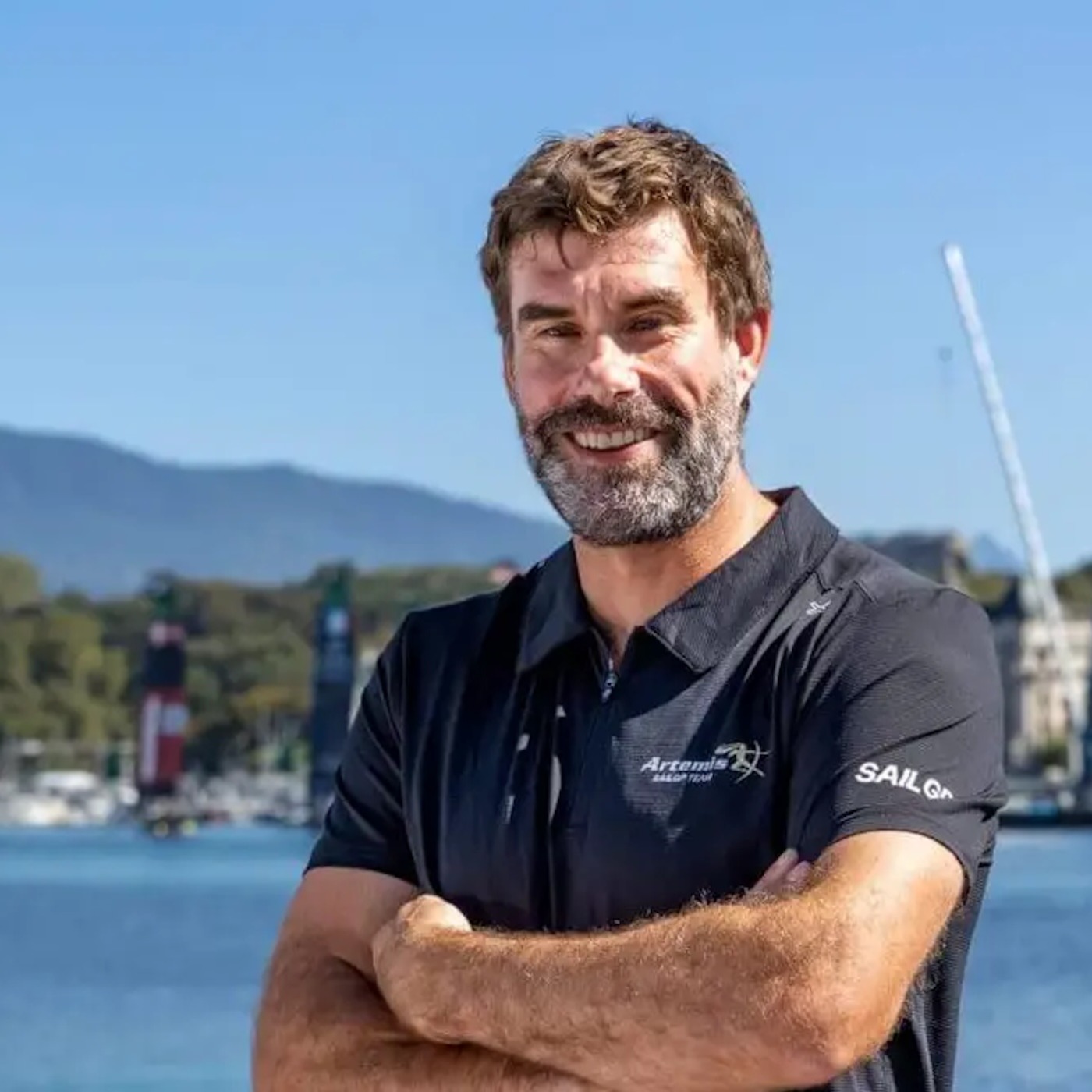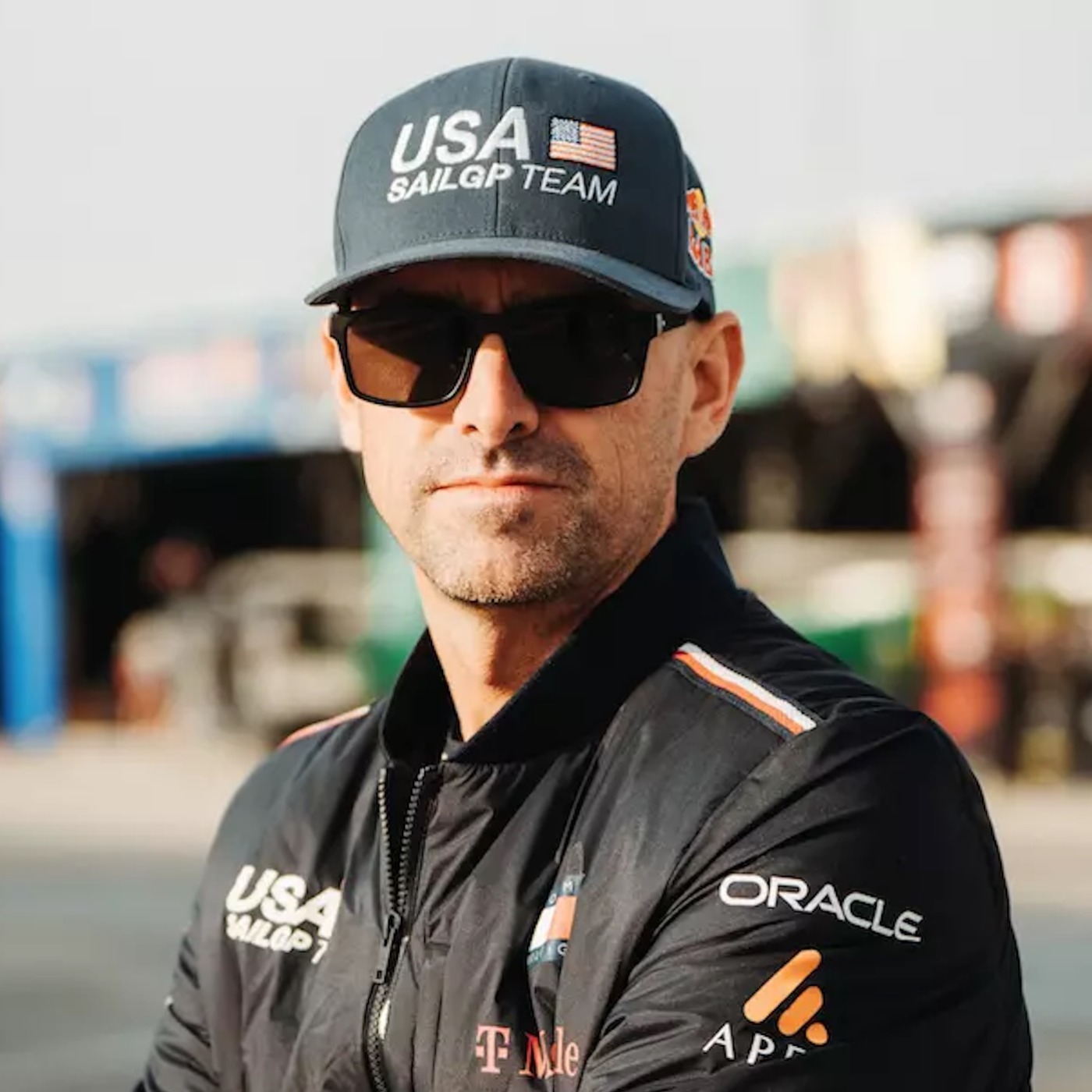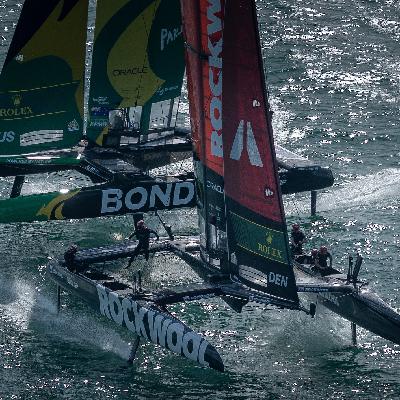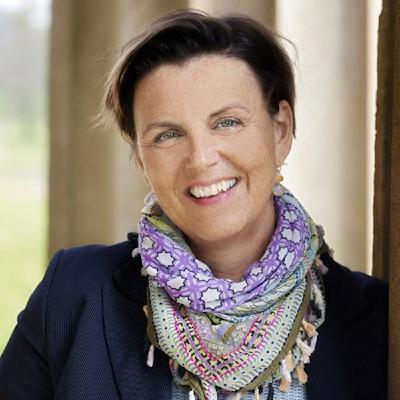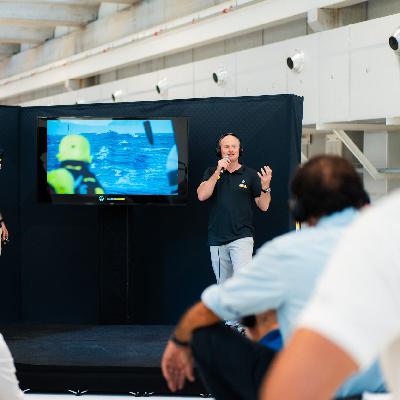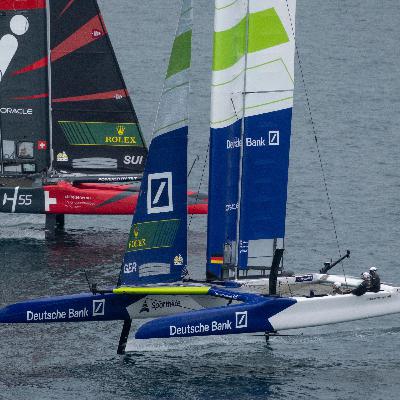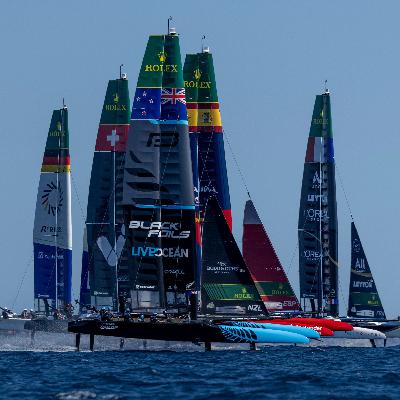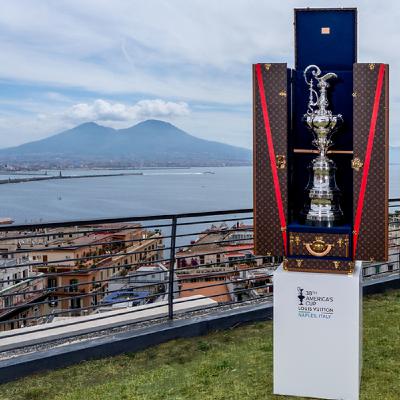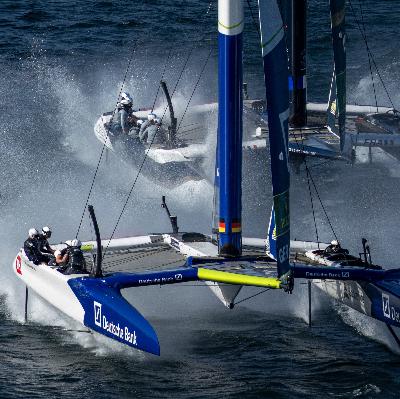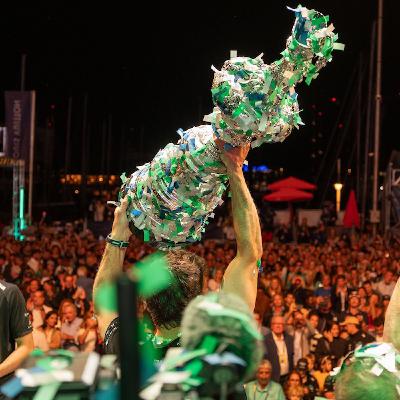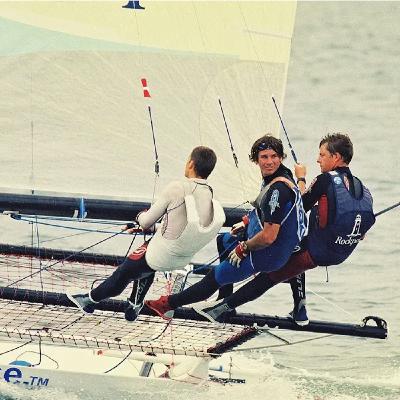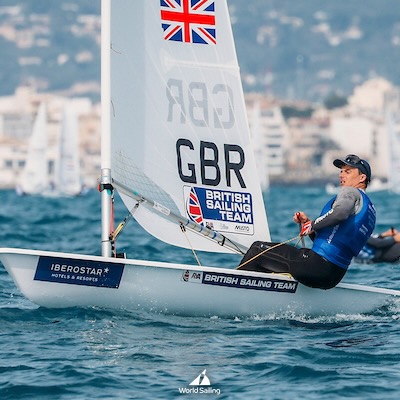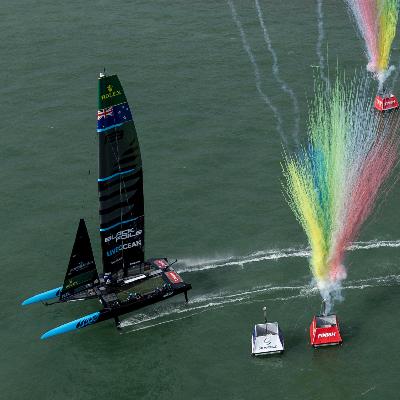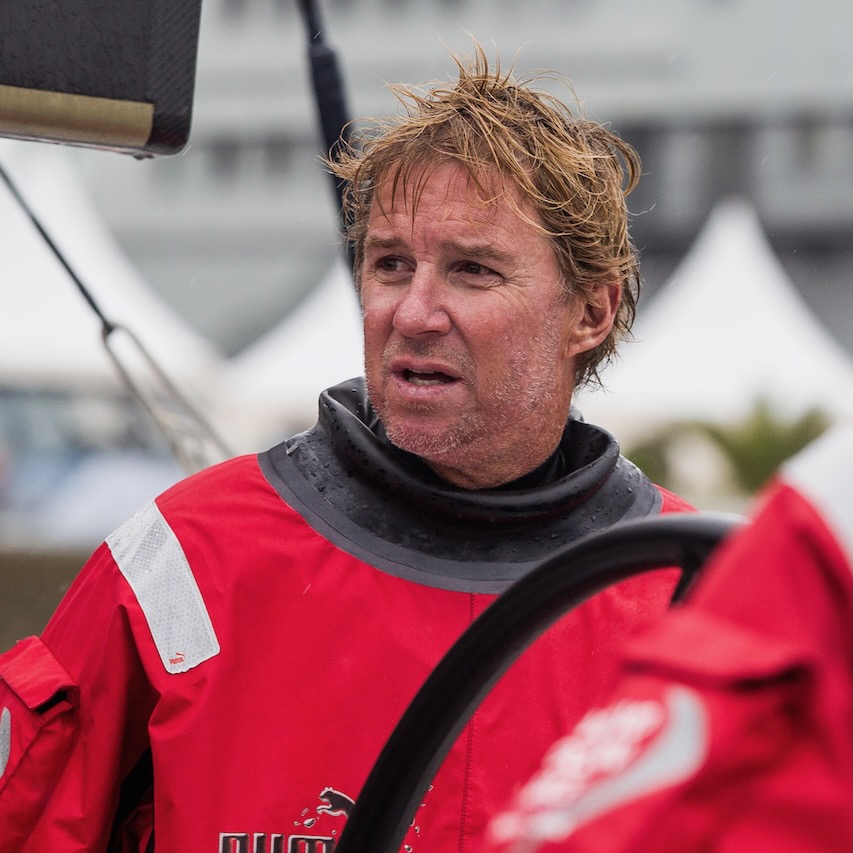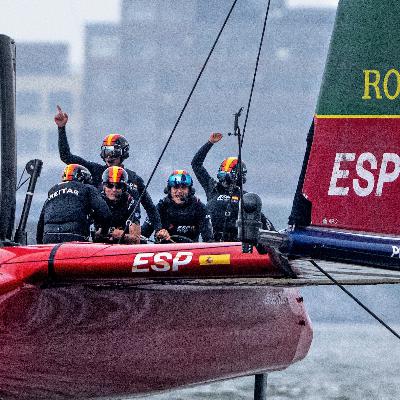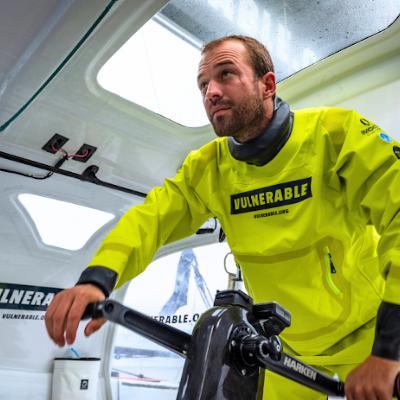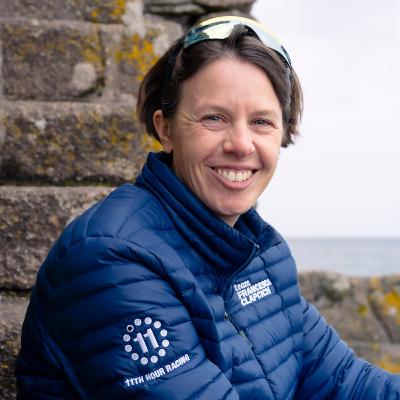Discover Yacht Racing Life Podcast
Yacht Racing Life Podcast

101 Episodes
Reverse
Successful dinghy sailor Phil Kennard shares his journey from Olympic campaigning to his roles in Formula One and the PGA Tour, before returning to the world of sailing with SailGP as CEO of the Canadian team NorthStar.Support this podcast at — https://redcircle.com/yacht-racing-life-podcast3387/exclusive-contentAdvertising Inquiries: https://redcircle.com/brandsPrivacy & Opt-Out: https://redcircle.com/privacy
In this episode of the Yacht Racing Life podcast, hosts Justin Chisholm and Magnus Wheatley discuss the final SailGP event of the season held in Abu Dhabi. They analyze the challenges faced by the sailors during the racing, particularly the light wind conditions, and highlight the technological advancements that have allowed for racing in such conditions. The conversation shifts to team performances, strategies, and the impact of key figures like Phil Robertson on team dynamics. They reflect on the Grand Final, emphasizing the importance of team cohesion and the future of SailGP in relation to the America's Cup. The episode concludes with thoughts on emerging talents and potential changes in team line-ups for the next season.TakeawaysSailGP's final event showcased the challenges of racing in light winds.Technological advancements have improved racing capabilities significantly.Team cohesion is crucial for success in competitive sailing.Phil Robertson's leadership has revitalized the Italian team.The Grand Final highlighted strategic decisions that influenced outcomes.Emerging talents are essential for the future of sailing competitions.The importance of financial backing in hosting events in various locations.Cultural factors affect spectator turnout at sailing events.The dynamic between SailGP and America's Cup will shape future competitions.Next season promises exciting developments and potential team changes.Image © Ricardo Pinto for SailGPSupport this podcast at — https://redcircle.com/yacht-racing-life-podcast3387/exclusive-contentAdvertising Inquiries: https://redcircle.com/brandsPrivacy & Opt-Out: https://redcircle.com/privacy
Justin Chisholm's guest this time is British triple-Olympic medallist Ian Percy, CEO of Artemis Technologies and the newly announced Swedish Artemis SailGP team – which will be skippered by Nathan Outteridge in Season 6 of the global high-performance circuit.During their chat the pair discuss Iain's role at Artemis Technologies, the reasons for Artemis joining SailGP, his thoughts on the relative merits of the America’s Cup and SailGP – and Iain gives fans a clue into just what they can expect from the new kids on the block when the new season gets underway next year.Image © Felix Diemer for SailGPSupport this podcast at — https://redcircle.com/yacht-racing-life-podcast3387/exclusive-contentAdvertising Inquiries: https://redcircle.com/brandsPrivacy & Opt-Out: https://redcircle.com/privacy
Justin Chisholm's guest is British dinghy sailor Andrew Mills, a past Olympic campaigner in the Finn class who recently won the International OK World Championship after topping a fleet of 212 boats during a week-long series on Lake Garda, Italy.Anyone looking for tips on how to put together a major championship campaign of their own, will find plenty of interest in what is discussed during the interview.Support this podcast at — https://redcircle.com/yacht-racing-life-podcast3387/exclusive-contentAdvertising Inquiries: https://redcircle.com/brandsPrivacy & Opt-Out: https://redcircle.com/privacy
I sit down with USA SailGP team boss Mike Buckley for a frank and open chat about his experience of leading a team in SailGP, including: the importance of resilience and thick skin; the team’s challenges on the water; the impact of bringing in new sailors; the fundamental difference between America’s Cup and SailGP teams; and his plans for the team’s medium and long-term future.Support this podcast at — https://redcircle.com/yacht-racing-life-podcast3387/exclusive-contentAdvertising Inquiries: https://redcircle.com/brandsPrivacy & Opt-Out: https://redcircle.com/privacy
In this episode of the Yacht Racing Life podcast Justin Chisholm is joined by the Rule69Blog’s Magnus Wheatley to unpack a light-air weekend of racing at the SailGP event in Cádiz, Spain. Justin was on site for practice and day one before watching Sunday’s action on replay. The verdict: a picturesque venue and big crowds, yet a regatta that often turned into starting practice in marginal breeze and awkward sea state.Venue and vibeCádiz impressed. The old city serves up surfy beach culture on one side and a natural stadium on the other, with fans lining a huge sea wall. The media centre sat in the castle at the end of the wall, which gave a drone-like view straight down to the leeward gates. The local crowd were all in for Spain SailGP Team, although the weekend did not go their way.Tech talk: a new 27.5 m wingSpain missed the fleet practice after being tasked to help validate the new 27.5 metre wing that SailGP hopes to have available in time for the Abu Dhabi Season 5 Grand Final in Abu Dhabi – a traditionally light air venue. Magnus remains sceptical of the sales pitch around performance benefits of the new light airs foil and rudder packages and suggests that the introduction of the new wing config is driven by safety concerns after a string of rig failures. The racing: Britain nail the big momentsEmirates Team GBR delivered a measured, champion’s performance. Starts were cleaner on Saturday than Sunday, yet the hallmark was damage limitation when it went wrong. Twelfths and elevenths became sixths and sevenths, which kept the points tally moving. In the final, Dylan Fletcher and Hannah Mills, with Iain Jensen and Luke Parkinson, executed a smart two-marks-ahead plan in the fleet racing and then stole the final from the Kiwis with an perfectly executed attack at the final turning mark.Season picture after CádizGreat Britain 85 ptsNew Zealand 82 ptsAustralia 80 ptsSpain on 76 points remain fourth and still in with a shout of making the Grand Final. France in fifth look too far back to threaten.Format and fairnessJustin worries about the winner-takes-all finale. With three elite teams you risk one soft start deciding a season. Magnus counters that jeopardy is sport, simple to explain, and essential for broadcast. Both agree it does not always crown the most complete team across the year, yet within SailGP’s entertainment remit it works.A separate gripe was the short first downwind. If you stuck the first jibe and were top three at Mark 1 you were gone. Passing lanes were scarce, especially with twelve boats and light air. Magnus would like Russell Coutts to trial split-fleet racing in these conditions. Who impressed, who struggledDenmark were superb on Saturday. Smooth, tidy manoeuvres, gliding through manoeuvres. A late fall off the foils on Sunday ended their hopes, yet they bank a big confidence block after their performance on the opening day.Germany made their second consecutive final – a reward for making attacking decisions.United States were improved, with a third, fourth and fifth on the sheet, and finished eighth overall.Canada remain ‘ying and yang’ – as skipper Giles Scott previously described them. Moments of front-running class, then the wheels wobble.France were sixes and sevens on Saturday, sharp on Sunday. Consistency is the missing piece.Italy look lost. Setup, coaching and roles need a hard review.Switzerland made poor percentage calls at key gates and paid heavily.Australia won a race then faded. If Abu Dhabi is light they are the most vulnerable of the top three to a Spanish surge.New Zealand were one tack from the win, so will feel bruised yet reassured about pace.Looking ahead to Abu DhabiHistory suggests light air, although sailing loves to surprise. If it is marginal, expect Spain to attack with nothing to lose and the Australians to feel the heat. The Brits look the complete package across conditions, while the Kiwis remain highly potent in the breeze.Final thoughtCádiz was a reminder that even in a manufactured league the sailors’ craft still decides the biggest moments. The British final-mark sequence was world class. Now all eyes turn to Abu Dhabi, where for the top three teams a season’s worth of hard work will be settled in a single race for a very large cheque.Image © Samo Vidic for SailGPSupport this podcast at — https://redcircle.com/yacht-racing-life-podcast3387/exclusive-contentAdvertising Inquiries: https://redcircle.com/brandsPrivacy & Opt-Out: https://redcircle.com/privacy
Justin Chisholm sits down with Vicky Low, CEO of The Magenta Project, to unpack how a volunteer-driven idea born out of the Team SCA all-women campaign in the Volvo Ocean Race 2014-15 has evolved into one of the sport’s most effective engines for getting more women into sailing.From Team SCA to a Global MovementMagenta began when the Team SCA squad realised that, post-campaign, very few of the women had immediate opportunities. The early goal was simple: create teams and seats. The breakthrough, Vicky explains, was recognising that mentoring scales impact far wider than a single campaign. Since 2018, Magenta’s mentoring programme has become its “jewel in the crown”, spawning practical pathways across offshore, inshore, foiling, media, race management, leadership, and — crucially — STEM roles that power the sport and the industry behind it.What’s Changed — and What Hasn’tWomen’s sport has surged in the last decade and sailing is catching up, but Vicky is candid about where the friction still lives: not so much at the elite level, but at clubs and local events where too many still don’t feel welcome. Magenta’s new 2 x 25 global survey (an update to its 2019 strategic review) shows a big uptick in perceived opportunity — yet persistent themes of discrimination, access, and, above all, confidence remain. (“Opportunity” was the most-used word in 2019; in 2025 it’s “confidence.”)What Magenta Is Doing NowMentoring at scale: 120+ mentors to date; this year’s intake will double to ~50 mentees across sailing and industry roles, with rising demand in STEM and female leadership.Hands-on pathways: Clinics and workshops alongside major events that demystify mechatronics, hydraulics, and performance data for aspiring shore and engineering talent.RORC x Magenta Offshore Weekend: 31 women training and racing offshore, tackling the confidence gap with real miles and real teams.Mighty Magenta Hub (launching early October): A global community platform where skippers, teams, clubs and companies can post opportunities and connect with candidates — from a spare foredeck spot to a graduate engineering role.Industry advocacy: Collaborations (e.g. at METSTRADE Young Professionals Club) to help companies “reverse-engineer” better hiring and retention for women.Quotas vs Quality — and Why Pathways MatterVicky supports mandates that create space (e.g. women on AC75 crews) — but insists the sport must invest in training pipelines so teams pick the best person for the job, not a token. Showcase events like the Women’s America’s Cup help accelerate readiness, but the real test is year-round depth: coaching, seat time, and exposure to the technical systems that decide modern performance.How You Can Help Skippers/Team Managers: Offer a berth, training day, delivery leg, or shore-side project via the Mighty Magenta Hub (early October).Mentors (men and women): Volunteer expertise across sailing, engineering, ops, comms, and leadership.Clubs/Classes: Audit your culture. Replace the “members only” mindset with active welcome, clear pathways, and visible role models.Sponsors/Employers: Fund seats and internships; co-create entry programmes for STEM roles. The talent is there — help unlock it.Connect with The Magenta ProjectEmail: contact@themagentaproject.orgJoin: Look out for the Mighty Magenta community launch in early October and become a Friend of Magenta to access opportunities, resources, and events.If we do this right, says Vicky, Magenta will make itself obsolete — because inclusive pathways will be the sport’s default. Until then, they’re building the “village” sailing needs.Support this podcast at — https://redcircle.com/yacht-racing-life-podcast3387/exclusive-contentAdvertising Inquiries: https://redcircle.com/brandsPrivacy & Opt-Out: https://redcircle.com/privacy
On the latest episode of the Yacht Racing Podcast Justin Chisholm quizzes Australian Olympian, two-time America’s Cup winner, and current wind-powered land speed record holder Glenn Ashby about his role as rig designer for the Ferrari Hypersail project.Support this podcast at — https://redcircle.com/yacht-racing-life-podcast3387/exclusive-contentAdvertising Inquiries: https://redcircle.com/brandsPrivacy & Opt-Out: https://redcircle.com/privacy
Justin and Magnus Wheatley give an honest appraisal of a tricky weekend in Geneva: beautiful setting, ultra-light winds, and racing that was “mostly non-foiling”—at times dull for viewers and deeply frustrating for the crews.The bright spot was Germany’s breakthrough: the team reached their first event final and converted it into a maiden SailGP win. After finishes of 9-7-5 on day one, they surged with 5-1-3 on day two, then held their nerve in a tense, patchy final –staying displacement while Tom Slingsby’s Australia briefly foiled – before catching a line of pressure and closing it out. The result bumps Germany to ninth overall and, more importantly, signals a tangible rise from the midfield.Technically, Geneva showcased the league’s new light-wind package: big wing (24 m²), high-speed rudders, and long-span light-air foils—tested most by Australia, whose wing trimmer Chris Draper has spoken about the foils’ “glide” profile. When the best teams were up and stable – New Zealand, Australia, Great Britain – their smoothness looked almost majestic. But the winds were fickle, and the weekend’s theme was cruel inconsistency: what worked one race didn’t the next. With three-person crews for such complex boats, coordination and comms became the differentiator. Justin and Magnus highlighted how the top teams shared workload on trimming, flight control, and helm transitions with crisp, encouraging dialogue – particularly audible aboard GBR and AUS.Germany’s win owed much to Stu Bithell. A double Olympic medallist steeped in fluky lake sailing in northern England, Bithell’s instinct in unstable breeze stood out. His on-board calls and fast jibe at the first downwind mark in the key race popped the boat onto its own private puff – “see ya” – a cheeky line Justin loved as the team sailed away while others sat planted.Stateside, USA showed modest encouragement – Taylor Canfield tends to look stronger when conditions resemble conventional displacement sailing, and they notched three fourths. The hosts nevertheless examined the broader project: visible commercial wins (e.g. Tommy Hilfiger activations) versus on-water results, Mike Buckley stepping off the boat (a hard but commendable call), and whether tapping the American Magic talent pool – for more names like Mike Menninger and Andrew Campbell – could finally fuse a competitive sailing core with their sponsorship muscle. Magnus stressed SailGP needs a strong U.S. team to crack the American market on broadcast.A major off-water storyline was Artemis Racing joining as the 13th team, with Ian Percy and Nathan Outteridge returning to the league. Both hosts applauded the move: Artemis brings resources, data savvy (they built SailGP’s simulator through Artemis Technologies), and a pathway for young Swedish sailors fresh from the Youth and Women’s Cups. They also noted the league’s climbdown from earlier chatter about 14 teams—now pushed to 2027—which they view as a PR stumble. Magnus floated a bold alternative for that open slot: an all-women’s team led by Hannah Mills, arguing that with will (and gearing tweaks if needed) the “grinding power” objection could be solved – and the PR upside would be huge.Looking ahead, the standings picture is sharpening: Australia edges Great Britain, with New Zealand third. France and Spain chase, but a late leap into the top three looks improbable. Cádiz is next – likely thermal and fully foiling – which means the front-runners may play percentages: avoid damage, bank solid scores, and roll into the Abu Dhabi finale (likely light again) ready for the three-boat, shot at $2 million.Image © Samo Vidic for SailGPSupport this podcast at — https://redcircle.com/yacht-racing-life-podcast3387/exclusive-contentAdvertising Inquiries: https://redcircle.com/brandsPrivacy & Opt-Out: https://redcircle.com/privacy
In the latest Yacht Racing Life Podcast, host Justin Chisholm and regular guest Magnus Wheatley dissect the SailGP regatta held in Saint-Tropez, a weekend dominated by tricky conditions, new technical challenges, and some standout performances.The French event saw Mistral winds wiped out Friday’s practice and cancel Sunday’s racing, leaving Saturday’s four races to decide the outcome.The British team emerged victorious, not through dazzling dominance but through consistency and resilience. Wheatley hails strategist Hannah Mills as the MVP, noting her sharp, concise communication with helm Dylan Fletcher. Together, they turned potential setbacks into solid results, epitomising the Olympic mindset of avoiding disasters and maximising opportunities. Their ability to read a critical wind shift in the final race secured the event win and valuable season points, keeping them firmly in the hunt for SailGP’s multimillion-dollar prize purse.Saint-Tropez featured small rigs and new high-speed rudders, whose thinner profiles and longer chords seemed to leave many crews struggling. Boat handling across the fleet looked ragged, with several teams hobby-horsing and nose-diving. Wheatley bluntly describes the overall standard as “bang average,” surprising for this stage of the season. Some teams, like Germany, showed logical progress, while others stagnated mid-fleet.The Italians drew particular attention after snatching a race win with a bold tack into a private shift. While Chisholm sees this as a potential breakthrough moment, Wheatley is sceptical, pointing out their inconsistent results and rigid tactical playbook. By contrast, he praises the Australians, New Zealanders, and British for their willingness to improvise and push limits, epitomised by Tom Slingsby sailing perilously close to the rules.One flashpoint was a mark-rounding incident between Australia and New Zealand. Debate centred on whether an overlap existed, with Wheatley emphasising the limitations of broadcast graphics compared to the precise data available to on-water umpires like Craig Mitchell. Both agreed the system is fair overall, though the margins—sometimes as fine as 20 centimetres—highlight how close to the edge these races are.Starting tactics were another theme. Several chaotic starts, particularly from Canada, the USA, and France, demonstrated the risks of overcrowded lines. Wheatley suggested SailGP’s stadium format, with only a handful of viable starting spots, creates a two-tier fleet dynamic. With 14 teams expected next season, he advocates splitting the fleet to ensure fairer, closer racing.Beyond performance, the conversation touched on SailGP’s equipment and future. The Southampton tech team earned praise for their rapid repairs, but Wheatley questioned whether the F50 platform remains fit for purpose. He floated the idea of smaller boats or even a wholesale redesign, noting that several designers had told him the current configuration would not be chosen if starting fresh. With Larry Ellison’s huge resources, new boats are theoretically possible, though Russell Coutts currently favours incremental upgrades.Looking ahead, both pundits anticipate different dynamics in Geneva, where light-wind foils will debut, enabling racing in as little as seven or eight knots. Wheatley sees opportunities for Italy, Britain, and Canada to capitalise, while also keeping an eye on underperformers like Switzerland and the USA, and on Germany’s encouraging rise.The episode closes with reflections on team dynamics. Wheatley contrasts Canada’s fraught atmosphere with the British team’s harmony, emphasising the crucial role of communication and coaching. He credits coach Rob Wilson’s tactical calls as another factor in the British success. Ultimately, both commentators believe the season finale will boil down to the established trio of Australia, New Zealand, and Britain, with Spain an outside contender after a steady showing.Despite criticising the spectacle as a “donkey derby” at times, Wheatley acknowledges the intensity and jeopardy that keep SailGP compelling. For Chisholm, the regatta underlined both the flaws and fascination of the format, setting up intriguing battles for the remaining events in Geneva and Cádiz.Image © Felix Diemer for SailGPSupport this podcast at — https://redcircle.com/yacht-racing-life-podcast3387/exclusive-contentAdvertising Inquiries: https://redcircle.com/brandsPrivacy & Opt-Out: https://redcircle.com/privacy
The America’s Cup has entered a bold new era with the release of the Protocol for the 38th edition, and it’s nothing short of revolutionary. A new governing body — the America’s Cup Partnership — will run the event, promising continuity, a two-year cycle, and more transparency than ever before. Defenders Emirates Team New Zealand and Challenger of Record Athena Racing have given up traditional powers in favour of stability, cost controls, and broader commercial appeal. The changes are sweeping: existing AC75s will be reused, budgets capped at €75m, cyclors replaced by batteries, and at least one female sailor mandated on every crew.Justin Chisholm is joined by Andy Rice (sailjuice.com and Road To Gold) and Dave Reed (editor at Sailing World Magazine) to dissect what’s gained, what’s lost, and who the big winners could be. From Pete Burling’s shock switch to Italy to the looming SailGP rivalry, this Protocol sets a dramatic course for Naples 2027.Support this podcast at — https://redcircle.com/yacht-racing-life-podcast3387/exclusive-contentAdvertising Inquiries: https://redcircle.com/brandsPrivacy & Opt-Out: https://redcircle.com/privacy
Justin Chisholm and Magnus Wheatley get into the nitty gritty of the explosive first-ever German SailGP event that took place in Sassnitz over the weekend.Support this podcast at — https://redcircle.com/yacht-racing-life-podcast3387/exclusive-contentAdvertising Inquiries: https://redcircle.com/brandsPrivacy & Opt-Out: https://redcircle.com/privacy
Justin Chisholm declares his support for the groundbreaking new Protocol for the 38th America’s Cup — a document that has reshaped sailing’s most prestigious event.Support this podcast at — https://redcircle.com/yacht-racing-life-podcast3387/exclusive-contentAdvertising Inquiries: https://redcircle.com/brandsPrivacy & Opt-Out: https://redcircle.com/privacy
Justin Chisholm reads Ed Gorman's story about Britons Tim Robinson and Zeb Elliott, and Australian Dave Witt, who in 1999 made history by becoming the first Northern Hemisphere–skippered crew to win the JJ Giltinan Trophy – the world championship of 18 Foot Skiff racing on Sydney Harbour.
Support this podcast at — https://redcircle.com/yacht-racing-life-podcast3387/exclusive-content
Advertising Inquiries: https://redcircle.com/brands
Privacy & Opt-Out: https://redcircle.com/privacy
In this episode of The Yacht Racing Life Podcast, host Justin Chisholm sits down with British Olympic campaigner Micky Beckett for a wide‑ranging and candid conversation about his journey in the Laser (ILCA 7) class, the brutal highs and lows of Olympic campaigning, and his plans for the future.
From growing up in a tiny Welsh harbour, crashing around in a home‑built dinghy, to standing on start lines against the world’s best, Beckett’s story is one of perseverance, learning, and a relentless drive for self‑improvement. He opens up about the influence of the British Sailing Team and his long‑standing rivalries with squad‑mate Elliot Hanson and Australian Olympic champion Matt Wearn. He shares how those rivalries have pushed him to evolve, both physically and mentally, and why surrounding himself with high‑calibre training partners is essential to his success.
We talk about the pain of Paris 2024, where his medal race unravelled in heartbreaking fashion after a restart and a pair of costly penalties. Beckett reflects with refreshing honesty on the disappointment of finishing sixth and the process of rebuilding his confidence and drive in the months that followed. That journey led to an emphatic statement win at the Trofeo Princesa Sofía in Palma – his fourth successive title there – proving to himself and the fleet that he still belongs at the sharp end of the class.
Listeners will get a fascinating insight into the day‑to‑day life of a full‑time Olympic sailor: the three‑hour training sessions in Weymouth Bay, the gruelling gym work needed to stay competitive in the physically punishing ILCA 7, and the importance of managing recovery to avoid the burnout that comes with life on the campaign trail. Beckett also shares his practical advice for club sailors who want to hike harder, recover faster, and sail smarter.
But this conversation goes beyond racing. Beckett reflects on the independence and resilience he developed as a teenager, sailing alone off the Pembrokeshire coast, and how that mindset carried him through university and into the professional ranks. He speaks about his inspirations – from Sir Steve Redgrave and James Cracknell to Sir Ben Ainslie – and how their stories shaped his own approach to sport.
Finally, we look ahead to his next big goal: the Los Angeles 2028 Olympic Games. Beckett outlines his plan to peak at the right time, the work still to be done at the Long Beach venue, and his dream of one day stepping into the America’s Cup or SailGP arena.
Whether you’re a Laser sailor, an Olympic sailing fan, or simply curious about what it takes to compete at the highest level, this is an episode full of insights, inspiration, and no‑nonsense honesty from one of the class’s most thoughtful and determined competitors.
Listen now and join Beckett on his journey from the pain of Paris to the pursuit of perfection in Los Angeles.
Support this podcast at — https://redcircle.com/yacht-racing-life-podcast3387/exclusive-content
Advertising Inquiries: https://redcircle.com/brands
Privacy & Opt-Out: https://redcircle.com/privacy
Episode Summary:
In the latest episode of The Yacht Racing Life Podcast, Justin Chisholm sits down with fellow sailing journalist Magnus Wheatley to unpack a packed weekend of world-class racing at last weekend's British SailGP event. From the electric atmosphere in Portsmouth to Britain’s much-needed resurgence, the pair dive deep into the stories behind the racing – from Dylan Fletcher’s standout performance under pressure to the bold new ideas shaping the league’s future.
Key Highlights:
On-the-water impressions: Why the stadium-style SailGP experience is unlike anything else in sailing.
Team GB’s bounce back: Dylan Fletcher, Hannah Mills, and the crew deliver under home pressure.
Big picture SailGP: Russell Coutts’ vision – including a dedicated “tech ship” and propulsion-assisted racing for light venues.
Women at the wheel? What’s next for female sailors in the league – and is Hannah Mills in line for her own SailGP team?
Swiss breakthrough & Italian struggles: Which teams impressed and which left questions unanswered.
Press conference candour: Why SailGP’s media approach still misses the mark.
Human story: Magnus shares his involvement in helping blind sailor Danny Phipps attempt a solo circumnavigation of the Isle of Wight.
About the Guest:
Magnus Wheatley is a veteran sailing journalist and commentator, best known for his Rule 69 Substack, where he offers sharp insight and candid commentary on the world of professional yacht racing.
Call to Action:
If you enjoyed this episode, please subscribe to The Yacht Racing Life Podcast on your favourite platform and share it with your sailing friends. For more in-depth coverage, visit YachtRacingLife.com.
Support this podcast at — https://redcircle.com/yacht-racing-life-podcast3387/exclusive-content
Advertising Inquiries: https://redcircle.com/brands
Privacy & Opt-Out: https://redcircle.com/privacy
Justin Chisholm sits down with North Sails president Ken Read for a look across the recent goings on in the sailboat racing world.
We start with the IMOCA class — that wild, high-stakes solo circuit that somehow keeps cranking out close finishes in the middle of nowhere. Kenny was glued to the last Vendée Globe like the rest of us, marvelling at the match race up front and the level of detail behind every campaign.
From there, we go deep into the design side. Read talks about how the North Sails brain trust has gone full tilt on integrating aerodynamics and hydrodynamics — a shift driven by the America’s Cup but now baked into every serious offshore campaign. “It’s not sails and boats anymore,” he says. “It’s a single system.” And it’s not just designers and sailors in the loop. Software engineers, CFD specialists, VPP gurus — it’s a full-circle design process now, and if you’re not closing that loop, you’re getting left behind.
And what about the ongoing health of the IMOCA class in recent years? Stronger than ever, says Read. The French dominance isn’t a problem – it’s the reason the class works. The culture, the fan base, the sponsors, the European kids who grow up wanting to be offshore sailors — that’s the fuel in the tank. Sure, there’s chatter about needing more international flavour, but as Read puts it: “It’s kicking ass. Don’t mess with it.”
We veer into the age-old mystery of why this style of sailing hasn’t taken off in the States. There’s no simple answer, but Kenny gives it a go. He talks about a missing culture, a lack of aspirational heroes, and the need for more people to “give back” if the next generation is going to get inspired. “We just don’t have a pipeline,” he says.
Then comes the Ferrari segment. The Hypersail project is everything you’d expect from the Italian supercar maker: fast, sleek, secretive, and a little bit nuts. Read says it’s “IMOCAs on steroids,” with a dream team of designers and engineers (including Guillaume Verdier) and full integration of aero and hydro from the start. And yes, North Sails and Southern Spars are right in the thick of it. There’s even a Ferrari-branded performance clothing line in the works — because why not?
We move on to the Moth World Championship, where a kid named Enzo Balanger came out of nowhere to take down the heavyweights. Read credits Bruno Dubois with spotting the talent early — just as he did with Caudrelier years ago — and says Enzo’s win proves he’s the real deal. The Moth, he adds, remains a bleeding-edge test lab for sail design and control systems. Forget trickle-down from the Cup — the Moth is a two-way street for innovation.
So what about the rest of us non-foilers? Read says traditional sailing’s still alive and well — for now. But fast forward ten years, and don’t be surprised if kids are foiling on everything. “They’re not going to want to go back in the water,” he says.
Then there’s the offshore shift to sailing from inside — driven, Read says, by one thing: the violence of the waves, rather than the wind. “You get hit by a wall of water and find yourself in the back of the boat with half the wheel in your hand,” he recalls from his Volvo Ocean Race days. Safety is now the top priority, and he doesn’t see anyone going back outside anytime soon.
Is there still room for big boats like Comanche? Absolutely, says Read. Under IRC, there’s a thriving maxi scene, and boats like V (formerly Tango), which he’s now helping to campaign, are keeping the sport accessible for owner-drivers who want to race hard and have fun....
Support this podcast at — https://redcircle.com/yacht-racing-life-podcast3387/exclusive-content
Advertising Inquiries: https://redcircle.com/brands
Privacy & Opt-Out: https://redcircle.com/privacy
In this episode of The Yacht Racing Life Podcast, Justin Chisholm is joined from the UK by fellow yachting journalist Magnus Wheatley to dive into all the drama, intrigue, and slippery foils of the the sixth event of SailGP Season 5, which took place in New York last weekend.
While neither of them got the call-up from Russell Coutts to attend in person (again), Justin and Magnus were watching intently online and had plenty to say about a weekend of unpredictable conditions, inconsistent performances, and some curious tactical decisions.
Magnus begins with heaps of praise for the SailGP tech team for getting the boats racing at all after the major repair operation that has taken place in the last 12 weeks.
The pair talk about the impact of the light-air LAB foils—and how some of the fleet looked like they were back in Season 1—and question the wisdom of requiring just three crew for the first race on Saturday. Spain were worthy winners, but nobody really dominated. Even the mighty Aussies looked rattled, perhaps distracted by their new A-list ownership?
Justin and Magnus tip their hats to the Brazilians, with Martine Grael looking more relaxed and effective at the helm—clearly benefiting from the support of Paul Goodison, Leigh McMillan, and Andy Maloney.
Off the water, they tackle the booming commercial side of SailGP. Celebrity investors, eyewatering valuations, and a media machine that’s clearly focused on global reach more than just the core sailing fan. They speculate on American Magic’s rumoured interest in the US team, discuss where the real value lies in these franchises, and whether Russell Coutts' high-stakes game could reshape sailing’s professional landscape.
The duo finish with a few bold season-winner predictions. Listen to the end to find out who they each back.
Support this podcast at — https://redcircle.com/yacht-racing-life-podcast3387/exclusive-content
Advertising Inquiries: https://redcircle.com/brands
Privacy & Opt-Out: https://redcircle.com/privacy
Justin Chisholm’s guest is the British solo around-the-world sailor Sam Goodchild.Goodchild recently fulfilled a 14 -year dream to compete in the Vendée Globe solo, nonstop, around-the-world race. Racing as part of Thomas Ruyant’s two boat TR Racing campaign and on a previous generation IMOCA he led the race several times in the early stages heading down the Atlantic and entered the final fortnight of the race in a battle for fourth place with Vendée veteran Jérémie Beyou on his new generation boat Charral.Disappointingly catastrophic mainsail damage in a storm on the approach to Cape Finisterre at the entrance to the Bay of Biscay saw him split his mainsail in two. Ever resourceful Goodchild somehow managed to glue the sail back together on the rolling pitching wave-washed deck of his 60-foot yacht and get back in the race to finish a highly credible ninth overall.Justin caught up with him recently at his home in Lorient where he lives with his wife and two children.Image © Pierre Bouras
Support this podcast at — https://redcircle.com/yacht-racing-life-podcast3387/exclusive-content
Advertising Inquiries: https://redcircle.com/brands
Privacy & Opt-Out: https://redcircle.com/privacy
Justin Chisholm's guest is Italian / American sailor Francesca Clapcich. Frankie – as she is best known – has had an amazing career in sailing since having been introduced to the sport by her parents when she was a young child growing up in Trieste, Italy. She has won world and European titles, twice represented Italy at the Olympic Games, is the first Italian to sailor win The Ocean Race, and competed at last year's Women's America's Cup. If all that isn’t enough – she’s also a CrossFit Coach, a triathlete, and ski instructor, too. Despite having achieved so much, Frankie is far from ready to rest on her laurels and last month announced her campaign to compete in the 2028 edition of the world’s toughest yacht race – the singlehanded, nonstop, around the world Vendée Globe. Frankie spoke to us from her home in Park City, Utah where she lives with her professional sailor wife Sally Barkow and their young daughter Harriet.[Image © Eloi Stichelbaut - polaRYSE / 11th Hour Racing]
Support this podcast at — https://redcircle.com/yacht-racing-life-podcast3387/exclusive-content
Advertising Inquiries: https://redcircle.com/brands
Privacy & Opt-Out: https://redcircle.com/privacy


